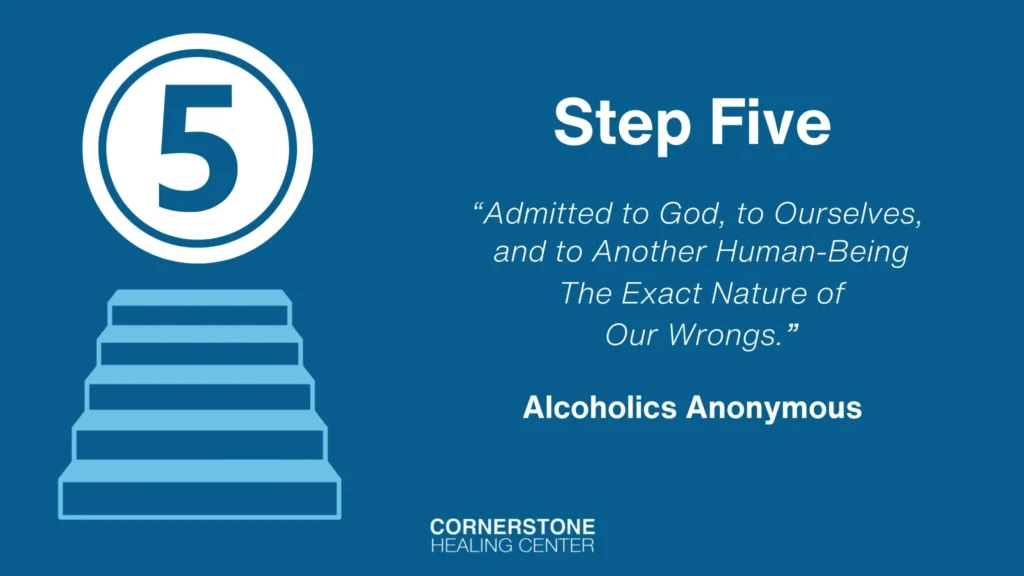
Finding Courage on the Road to Recovery: Navigating the 5th Step
The 5th Step of the 12 Step program invites those in recovery to find the courage within themselves to admit their wrongs and pave the way for personal healing. This admission sets the stage for a profound transformation.
The Essence of the 5th Step
The 5th Step encourages individuals to admit their wrongs openly, serving as a crucial step toward self-awareness and healing. This admission is threefold: to oneself, to a higher power, and another person. It’s a process that combines spiritual and psychological healing, leading to profound personal growth.
The Importance of Admission
Admission in the 5th Step acts as a pivotal moment toward confronting one’s innermost struggles and taking accountability for past actions. By giving voice to buried pains and truths, we open the door to deep self-reflection and vulnerability. This laying bare of the soul sets the stage for authentic healing by bringing issues to light in a spirit of understanding and renewal. It marks a courageous milestone along the road to recovery.
Spiritual and Psychological Benefits
The open admission encouraged in this Step leads to numerous spiritual and psychological benefits. Emotionally, it brings cathartic release, lessening feelings of guilt and shame that may have weighed down the spirit. This lifts a burden, allowing space for self-forgiveness and compassion. Some may also feel a restored sense of meaning or connection to something greater than oneself. Relationally, the courage and trust this Step represents can rebuild broken bonds and pave the way for forgiven connections. It plants seeds for a harvest of understanding and restored trust.
Preparing for the 5th Step
Before approaching this step, it’s essential to conduct a thorough self-assessment through deep introspection. This involves taking an unsparing personal inventory and identifying areas where one’s actions caused harm or wrongdoing. Understanding these past mistakes allows us to take full accountability as we move forward in recovery.
Self-Reflection and Inventory
Rigorous self-reflection provides the foundation to fully engage in the healing potential of the 5th Step. This means looking within to bravely face our complex humanity – regrets, anger, moments of cowardice or betrayal. By bluntly assessing these areas where we strayed from our values, we build the insight to admit our wrongs with conviction on the road toward redemption. This inventory process may not be easy, but undertaking it fuels profound personal evolution.
Choosing a Confidant
Selecting the right person to courageously confess our regrets to is central to the power of this Step. It should be someone compassionate and worthy of trust, who can hold space for our story with empathy and no judgment. Knowing they will listen with openness brings comfort. And their support can inspire our vulnerability, allowing us to find the words for admission we may have long buried inside. This confidant bears witness to our inner battles, giving us the strength to share honestly.
💡
FAQs:
Why is the 5th Step considered so important in the recovery process?The 5th Step is crucial because it involves admitting one’s wrongs openly, which can lead to significant psychological relief and spiritual growth. It encourages honesty, vulnerability, and accountability, which are essential for healing and recovery.
How do I know I’m ready to perform the 5th Step?Readiness for the 5th Step typically comes after thorough self-reflection and acknowledgment of one’s wrongs during the 4th Step. Feeling a sincere desire to share these with a higher power, oneself, and another person also indicates readiness.
Who should I choose to admit my wrongs to, and why?It’s important to choose someone you trust deeply, such as a sponsor, a close friend, or a spiritual advisor, who can listen without judgment and maintain confidentiality. The right person can provide support and understanding, which is vital for this step.
What if I’m not religious or don’t believe in a higher power?The concept of a higher power in the 12 Steps is open to personal interpretation. It can be anything greater than oneself that provides strength and guidance. This step can still be meaningful by focusing on the acts of self-admission and sharing with another person.
How detailed should I be when admitting my wrongs?Being as honest and thorough as possible is key. However, the level of detail can vary based on what you are comfortable sharing and what is necessary for your healing process. The goal is to be truthful and clear about the nature of your wrongs.
What should I do if I feel overwhelmed or scared about completing the 5th Step?Feeling overwhelmed is normal. It’s recommended to discuss these feelings with your sponsor or support group before proceeding. They can offer encouragement and share their own experiences, which can provide comfort and reassurance.
Can I repeat the 5th Step if I feel I didn’t do it correctly the first time?Yes, the 5th Step can be repeated. Recovery is a personal and ongoing journey. If you later identify more wrongs or feel you weren’t fully honest, it’s beneficial to go through this step again with the new insights.
What happens after I complete the 5th Step?After the 5th Step, individuals often feel a sense of relief and a stronger connection to their recovery process. It sets the stage for the subsequent steps, which involve making amends and continuing to work on personal growth and healing.
Executing the 5th Step
Navigating the Challenges
Executing the 5th Step surfaces deep fears and vulnerability many resist facing within themselves. But by embracing the discomfort of admission with courage and trust, we pave the way for authentic healing.
Facing Fear and Vulnerability
The searing exposure encouraged in the 5th Step stirs frightening emotions – grief, regret, and shame. To endure, remember you need not walk this path alone. Confidants, sponsors, and support groups help navigate the dark shadows this confrontation surfaces. Take solace in the fact that exposing our weakest moments to the light denies them dominance over our lives. Liberation awaits.
The Journey Continues: The Road of Recovery Calls Us Onward
The 5th Step of the 12-step program is not just a phase in the recovery process; it is a profound act of transformation and renewal. By embracing honesty and making amends, individuals pave the way for true healing and a future defined by integrity and growth. This step, challenging yet deeply rewarding, marks a pivotal point in the journey towards sobriety and self-discovery. It underscores the importance of accountability, the strength found in vulnerability, and the power of human connection in overcoming the shadows of the past.
As part of this journey, the support and guidance offered by recovery centers play an indispensable role. Cornerstone Healing Center, among others, provides a nurturing environment where individuals are encouraged to face their truths, supported by a community that understands the intricacies of recovery. Here, the 5th Step is not just a procedure but a passage to a new way of life, grounded in the principles of courage, honesty, and transformation.
In conclusion, the journey through the 5th Step is a testament to the resilience of the human spirit. It is a reminder that, though the path to recovery may be fraught with challenges, it is also filled with opportunities for profound personal growth and healing. With the support of institutions like Cornerstone Healing Center, individuals are not alone in their journey; they are part of a compassionate community dedicated to fostering recovery, one step at a time. The road calls us onward as we seek redemptive transformation.
Key takeaways
- Establishing an Honest Foundation: Admitting one’s wrongs fosters honesty and vulnerability—bedrocks for growth. This courage lays the groundwork for self-awareness, accountability, and finding community in our shared imperfection.
- Uncovering Spiritual and Emotional Wisdom: Owning our past humbles the spirit, yet lifts the heart's burden. Relief comes through long-hidden truths. We deepen bonds to wisdom sources greater than self—inner, outer and beyond.
- On Choosing a Compassionate Witness: The confidant who hears this admission solemnly is the shelter that makes such vulnerability possible. In this grace-filled space, we find the strength to speak our story without shame.
- Connecting to Others Supports Our Strength: This path is daunting, but walked together, courage grows. In community born of shared experience we find the balm for old wounds—and the wisdom to heal.
- Beyond Amendment: Sustaining Our Best Self: The 5th Step roots us in humility and self-compassion so we can grow. By unveiling our past, we pave the way for a future aligned with our highest values and our interwoven well-being.
References:
FHE Health: The Power of Admitting Your Wrongs in Recovery
Briarwood Detox: Step 5 of the 12 Steps: Tips, How to Do It, and Printable Worksheets
12Step.org: About Step 5 of the 12 Step Program
Narcotics Anonymous Basic Text
Serenity, A Companion for Twelve Step RecoveryContributors: Susana Spiegel and Kirsten Andersen







